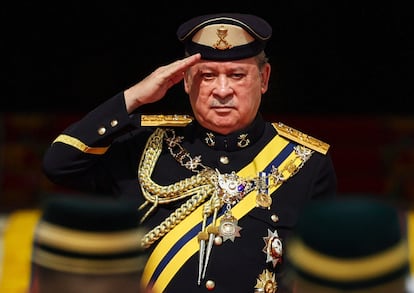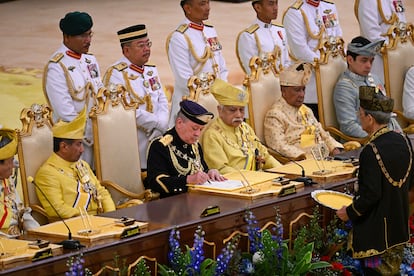Ibrahim Iskandar, an eccentric billionaire and now Malaysia’s new king, does not want to be a puppet
The sultan has a personal fortune of more than $750 million and family assets that exceed $5.3 billion. He owns a collection of 300 high-end cars, a cave inspired by ‘The Flintstones’ in his palace, and 60,000 Marvel comics

As of last week, Malaysia — the only country where kings rotate every five years — has a new head of state. Ibrahim Iskandar, the 65-year-old sultan of Johor, has ascended to the throne four decades after his father, the late Sultan Mahmud Iskandar. The new monarch, who will hold office until 2029, is one of the richest sovereigns on the planet, with a personal fortune that exceeds $750 million, according to Forbes magazine.
The billionaire is known for his eccentricities, but also for his frankness and his desire to meddle in politics. While the role of the Malay king has traditionally been symbolic, Ibrahim Iskandar has already announced that he doesn’t intend to “waste” his five-year-long reign by being “a puppet.” He has promised that he will focus on “fighting corruption” and “reinforcing national unity.”
King Ibrahim — the 17th Agong (meaning “supreme ruler”) of Malaysia since independence from the United Kingdom in 1957 — is the second governor of the southern state of Johor to ascend to the throne. His father was the first, between 1984 and 1989. Of Malay-British descent, he’s the first son from the marriage between Sultan Mahmud Iskandar and Josephine Trevorrow (a native of Cornwall), who had a total of four children.
Born on November 22, 1958, Ibrahim received his military training between Malaysia and the United States. Later, he completed his studies at the Fletcher School of Law and Diplomacy at Tufts University in Boston, where he specialized in Southeast Asian Strategic Studies and International Maritime Law. In 1982, he married Raja Zarith Sofiah, a member of the royal family of the Malaysian state of Perak. The new queen — a graduate of the University of Oxford — speaks five languages, writes children’s stories and is recognized for being involved in various social causes. Ibrahim and Raja have five sons and one daughter, born between 1984 and 2001. Their eldest son — Crown Prince Ismail — has assumed the regency of Johor while his father rules the country.
Malaysia is a confederation of 13 states and three federal territories. It has adopted a formula that’s unique in the world: an elective and rotating constitutional monarchy. Nine of the states are led by ethnic Malay rulers who lead their region for life. Their lineage dates back to the Malay sultanates of the 15th century. Under the Constitution, these nine dynastic lineages share the throne, while the head of state is rotated after a non-extendable period of five years. That is, the crown isn’t transmitted by bloodline after the death or abdication of the king, but rather falls on the leader of another of the royal families. Although the rotation follows an established order, the future regent requires majority approval from the nine sultans in a secret vote. Sultan Ibrahim Iskandar received the green light last October.
The new monarch is an unusual and indiscreet man. He frequently shares his sumptuous lifestyle on his Instagram account, where he has accumulated almost a million followers. Passionate about luxury vehicles, he drives a yellow Ferrari Testarossa and a Harley-Davidson. Among his whims, he has a collection of 300 high-end cars, one of which Adolf Hitler gave to his great-grandfather as a gift. King Ibrahim also owns a fleet of private jets, including at least three Gulfstreams and a blue-and-gold Boeing 737, in which he flew to Kuala Lumpur for his proclamation. In his palace, he has recreated a cave inspired by the Flintstones cartoon and a museum honoring his favorite childhood series. According to the Singaporean newspaper The Straits Times, the two-story building — with 15 rooms and two presidential suites ― also houses 60,000 original Marvel comics.

But his portfolio is much more extensive. As the laws of Johor don’t prohibit the state’s royalty from engaging in business activities, his family’s holdings are diverse: they own stakes in mines, palm oil production and soccer teams. Bloomberg estimates that his family’s assets exceed $5.3 billion. King Ibrahim also has about $100 million invested in public Malaysian companies and another $450 million invested in private firms. For instance, he holds a 25% stake in U Mobile, one of the largest phone providers in Malaysia. According to Bloomberg, his investment portfolio in the Malaysian real estate sector is almost $1 billion, while he owns land in central Singapore valued at $3.7 billion. Furthermore, the Johor Sultanate is the only one allowed to maintain its own private army.
Despite all of this wealth, King Ibrahim and his family enjoy high popularity in his native state, the second-most populous and one of the most thriving in the entire nation. He’s known for his religious tolerance (he attends Christmas and Diwali celebrations, in addition to Muslim festivals) and for taking a tough stance against social conservatism and discrimination. He’s an open critic of the Malaysian Islamic Party, which won the largest number of seats in the 2022 elections. The party advocates for policies such as a ban on alcohol and the enforcement of a dress code for women.
During his swearing-in ceremony on January 31, King Ibrahim promised to “firmly defend a just administration and peace in the country.” But the king’s power in this nation of 31 million people is mainly symbolic. In addition to being the high command of the Armed Forces, he represents the unity of the federation, where around 70% of the population is Malay, 22.6% is Chinese and 6.6% is Indian. His figure is especially prestigious among the Malay and Muslim majority, since the sultans act as custodians of Islamic traditions.
The new monarch — who is characterized by speaking without mincing words — has slipped in several interviews, stating that he will try to exercise a more influential position than his predecessors. Well-connected to the upper echelons of Singapore and with the local Chinese business community, he aspires to resume the project of a high-speed train linking Kuala Lumpur and Singapore. In the political sphere, his main priority is to combat corruption, for which he has proposed that the Anti-Corruption Commission and Petronas (the state’s oil and gas corporation, the cornerstone of the country’s economy) report directly to him, instead of to Parliament. He feels that the legislative branch is filled with dishonest officials.
While the new king claims to have a good relationship with Prime Minister Anwar Ibrahim, he has emphasized that during his reign the interests of the population will take precedence over what the politicians want. In the press, he has attempted to present himself as “a man of the people.”
“There are 222 of you [legislators] in Parliament. There are over 30 million [Malaysian citizens] outside. I’m not with you, I’m with them,” he told The Straits Times.
Sign up for our weekly newsletter to get more English-language news coverage from EL PAÍS USA Edition
Tu suscripción se está usando en otro dispositivo
¿Quieres añadir otro usuario a tu suscripción?
Si continúas leyendo en este dispositivo, no se podrá leer en el otro.
FlechaTu suscripción se está usando en otro dispositivo y solo puedes acceder a EL PAÍS desde un dispositivo a la vez.
Si quieres compartir tu cuenta, cambia tu suscripción a la modalidad Premium, así podrás añadir otro usuario. Cada uno accederá con su propia cuenta de email, lo que os permitirá personalizar vuestra experiencia en EL PAÍS.
¿Tienes una suscripción de empresa? Accede aquí para contratar más cuentas.
En el caso de no saber quién está usando tu cuenta, te recomendamos cambiar tu contraseña aquí.
Si decides continuar compartiendo tu cuenta, este mensaje se mostrará en tu dispositivo y en el de la otra persona que está usando tu cuenta de forma indefinida, afectando a tu experiencia de lectura. Puedes consultar aquí los términos y condiciones de la suscripción digital.









































